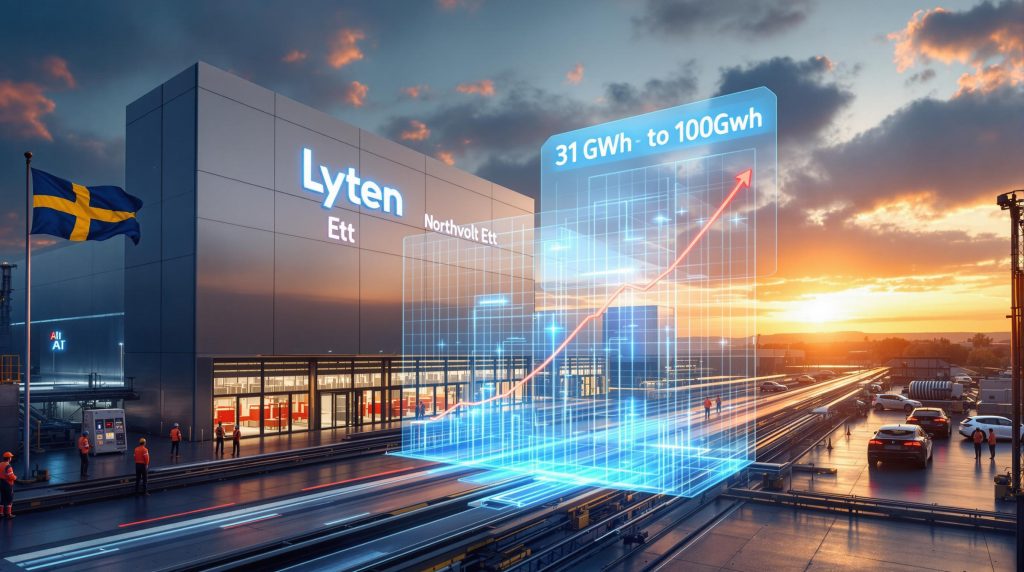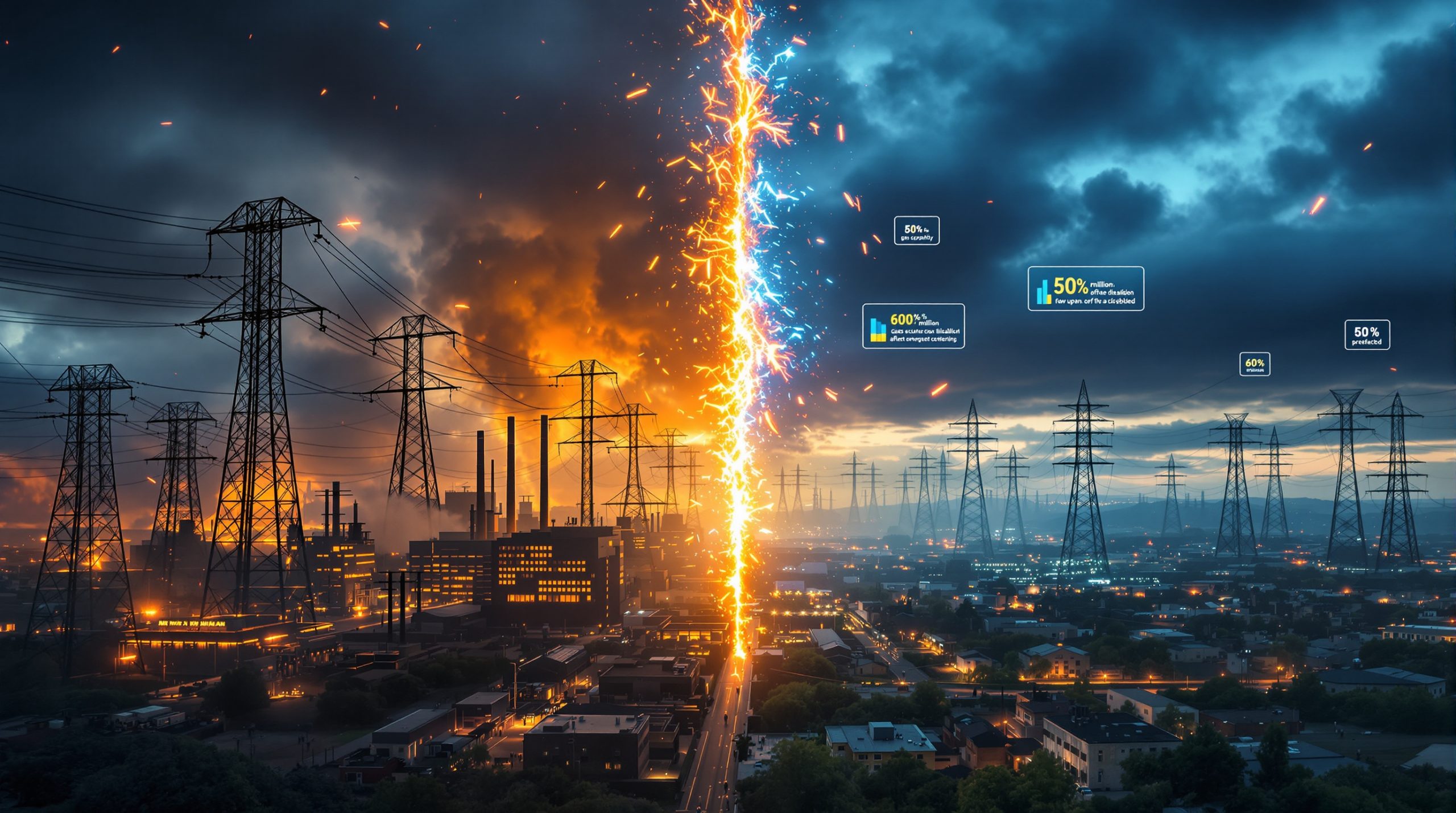Lyten's Strategic Acquisition of Northvolt Assets: Reshaping the Battery Industry Landscape
In a significant industry development, US-based battery manufacturer Lyten has completed a landmark acquisition of Northvolt's substantial European assets. This strategic move transfers approximately $5 billion worth of manufacturing infrastructure to Lyten, positioning the American company as a major player in the European battery market while providing a lifeline to critical battery production facilities.
What is the Significance of Lyten's Northvolt Asset Acquisition?
The acquisition represents one of the most substantial transfers of battery manufacturing capacity in recent years, with far-reaching implications for both the European and global battery markets. This deal salvages critical production infrastructure following Northvolt's bankruptcy filing in March 2025.
Overview of the Acquisition Deal
Lyten's acquisition encompasses assets valued at approximately $5 billion, representing a significant portion of Europe's domestic battery manufacturing capacity. The deal includes:
- 16GWh of existing operational battery manufacturing capacity
- More than 15GWh of additional capacity currently under construction
- Infrastructure and strategic plans to scale operations beyond 100GWh
- Full funding through private equity investments exceeding $200 million
This transaction provides Lyten with immediate manufacturing scale that would have otherwise taken years to develop organically, particularly in the competitive European market.
Strategic Assets Changing Hands
The portfolio of acquired assets represents some of Europe's most advanced battery manufacturing facilities:
- Northvolt Ett gigafactory in Skellefteå, Sweden – The flagship production facility representing Sweden's largest investment in battery manufacturing
- Northvolt Labs R&D unit in Västerås, Sweden – A critical research and development center for battery innovation
- Planned Northvolt Drei gigafactory in Heide, Germany – A 15GWh facility under construction intended to serve German automotive manufacturers
- Complete intellectual property portfolio from Northvolt, including patents, designs, and technical documentation
- Previously acquired BESS plant in Gdansk, Poland (July 2025) – Specialized in battery energy storage systems
- Previously acquired US facility in Cuberg, California (November 2024) – Focused on advanced battery research
This comprehensive asset transfer consolidates significant portions of Europe's battery manufacturing infrastructure under Lyten's control, fundamentally altering the competitive landscape.
Why Did Lyten Pursue This Acquisition?
The acquisition aligns with Lyten's strategic vision and accelerates its market penetration timeline dramatically, particularly in Europe where policy support for battery manufacturing remains strong.
Strategic Motivations Behind the Purchase
According to Lyten CEO Dan Cook, the acquisition "brings the facilities and Swedish talent to accelerate [Lyten's] mission by years, just at the moment when demand for Lyten lithium-sulfur batteries is growing exponentially to meet energy independence, national security and AI data center needs."
The strategic drivers behind this acquisition include:
- Accelerating market expansion by gaining immediate manufacturing capacity
- Addressing rapidly growing demand for advanced lithium-sulfur battery technology
- Positioning the company to meet stringent energy independence requirements
- Supporting critical national security applications for battery technology
- Establishing capacity to service AI data center power solutions
- Creating a formidable foothold in the European battery manufacturing ecosystem
The timing coincides with market shifts toward more diverse battery chemistries beyond traditional lithium-ion, particularly for specialized applications requiring higher energy density.
Market Positioning Advantages
Connor Watts, Battery Raw Material Demand Analyst at Fastmarkets, notes that "it makes sense for a predominantly US-based company to shift toward the European market" given current policy and demand conditions.
Key market positioning advantages include:
- Strategic geographic expansion from US operations into the European market
- Favorable policy environment leveraging European support for battery manufacturing
- Infrastructure efficiency by acquiring existing facilities rather than building from scratch
- Technical talent acquisition through the retention of Swedish expertise and engineering capabilities
- Technology diversification pathway to integrate proprietary lithium-sulfur chemistry into established production lines
The acquisition positions Lyten to compete directly with established Asian and European battery manufacturers while potentially leapfrogging development timelines for scaling production.
What Challenges Does Lyten Face With This Acquisition?
Despite the strategic advantages, Lyten faces significant challenges in integrating, operating, and financing these extensive manufacturing assets.
Operational Hurdles
Peter Carlsson, Northvolt's founder and former CEO, acknowledged in a social media post that there are "lots of challenges ahead to restart" operations at the facilities. These challenges include:
- Immediate operational restart requirements for Skellefteå and Västerås facilities
- Rebuilding trust with Northvolt's former automotive and industrial customers
- Integrating disparate corporate cultures and technical approaches
- Managing the complex transition from nickel-based lithium-ion to lithium-sulfur technology
- Balancing significant capital expenditure with revenue generation timelines
The successful integration depends heavily on Lyten's ability to retain key technical personnel and maintain production quality through the transition period.
Market and Financial Considerations
Connor Watts of Fastmarkets describes the acquisition as "a risky undertaking for Lyten," highlighting several market and financial challenges:
- Customer confidence: "It will be very important for them to find offtake partners for any resumed output from Northvolt's facilities – to rebuild trust and also to offset some of the capital outlay from this fairly sizeable investment"
- Regulatory navigation: Adapting to European regulatory frameworks as a US-based company
- Production continuity: Maintaining short-term production while planning long-term technology transitions
- Competitive pressure: Facing established battery manufacturers with strong customer relationships
- Capital intensity: Managing the significant financial demands of operating multiple large-scale manufacturing facilities
While discussions with Northvolt's prior anchor customers are described as "progressing constructively," securing firm offtake agreements remains a critical priority to ensure financial viability.
How Does This Acquisition Impact the Global Battery Industry?
The transaction represents more than a simple company acquisition—it signifies a fundamental restructuring of Europe's battery manufacturing landscape with global implications.
Reshaping of European Battery Manufacturing
Northvolt's bankruptcy in March 2025 was widely viewed as "a blow to the EU's efforts to establish a robust domestic battery industry." The company "had been seen as a flagship project for Europe's transition to the use of electric vehicles and to a more sustainable energy transition landscape."
Lyten's acquisition revitalizes these assets with several important implications:
- Preservation of manufacturing capacity critical to Europe's EV transition timeline
- Employment continuity for thousands of skilled technical workers
- Supply chain maintenance for European automotive manufacturers
- Technical capability retention within the European industrial ecosystem
- Policy support continuation for battery manufacturing initiatives
While European ownership is replaced by American control, the maintained production capacity supports Europe's strategic battery independence goals, albeit with a modified international alignment.
Technology Transition Implications
The acquisition signals potential shifts in battery technology adoption at commercial scale:
- Chemistry diversification: Introduction of lithium-sulfur technology alongside traditional lithium-ion production
- Production continuity: Maintenance of short-term nickel-based lithium-ion cell manufacturing
- Technology integration pathway: Phased approach to introducing alternative battery chemistries
- Market diversification: Expanded applications beyond automotive into energy storage and data centers
- Manufacturing foundation: Established production infrastructure for next-generation energy storage solutions
This transition represents one of the most significant opportunities to commercialize lithium-sulfur battery technology at scale—a chemistry that offers theoretical advantages in energy density and reduced reliance on certain critical minerals.
What Are the Business Continuity Plans?
Lyten has outlined both immediate operational priorities and longer-term strategic integration plans for the acquired assets.
Immediate Operational Strategy
Lyten plans to "immediately restart operations in Skellefteå and Västerås in Sweden on closing the transaction," with several parallel initiatives:
- Customer engagement: Continued discussions with Northvolt's former customers described as "progressing constructively"
- Production continuity: According to Keith Norman, Lyten's Chief Marketing and Sustainability Officer, the company plans to "restart the Gdansk BESS facility with the same product design and nickel-based lithium-ion battery cells as Northvolt was producing"
- Geographic expansion: Commitment to "pursuing the acquisition of [the planned 15GWh gigafactory] Northvolt Six in Quebec, Canada"
- Technology maintenance: Continued production of nickel-based lithium-ion chemistry in the short term
- Operational integration: Phased approach to incorporating Northvolt's facilities into Lyten's global operations
This phased restart approach prioritizes revenue generation while establishing the foundation for longer-term technology transitions.
Long-Term Integration Roadmap
Keith Norman indicated that Lyten's "long-term goal was to bring its proprietary lithium-sulfur chemistry to the product lineup," highlighting a strategic technology transition plan that includes:
- Gradual technology evolution from lithium-ion to lithium-sulfur production
- Manufacturing capacity expansion beyond the current combined 31GWh
- Supply chain development to support specialized lithium-sulfur production requirements
- Intellectual property leverage using Northvolt's acquired patents alongside Lyten's proprietary technology
- Production scaling toward the stated 100GWh capacity target across multiple facilities
This integration approach balances immediate production needs with longer-term strategic technology transitions, potentially positioning Lyten as a leader in next-generation battery manufacturing.
What Does This Mean for the Future of Battery Technology?
The acquisition has broader implications for the battery industry, energy transition timelines, and technology diversification strategies.
Industry-Wide Implications
This transaction highlights several important industry trends:
- Market consolidation: Growing concentration of manufacturing capacity among fewer, larger players
- European manufacturing challenges: Continued difficulties in establishing independent European battery production
- Chemistry diversification: Increasing investments in alternative battery technologies beyond traditional lithium-ion
- Energy storage demand growth: Rising requirements for advanced energy storage solutions across multiple sectors
- Manufacturing scale importance: Critical role of production capacity in enabling energy transition goals
The acquisition represents both a continuation of existing industry consolidation trends and a potential inflection point for alternative battery chemistry adoption.
Market Opportunities and Challenges
The transaction creates several significant market dynamics:
- Technology diversification potential: Opportunity to commercialize lithium-sulfur technology at unprecedented scale
- Demand alignment: Growing markets for specialized high-performance battery solutions in aviation, defense, and data centers
- Regional manufacturing evolution: Continued development of localized battery manufacturing capabilities
- Supply chain resilience: Potential for increased diversity in battery metals investment supply chains
- Energy transition foundation: Enhanced manufacturing capacity for deploying next-generation energy storage solutions
Important Note: While lithium-sulfur battery technology offers theoretical advantages in energy density and reduced dependence on certain critical minerals, commercial-scale production remains technically challenging. The success of Lyten's long-term strategy depends on overcoming significant manufacturing hurdles that have limited previous commercialization attempts.
The acquisition potentially accelerates the timeline for lithium-sulfur battery commercialization while maintaining critical lithium-ion production capacity—a dual-track approach that balances immediate market needs with longer-term technology innovation.
FAQ: Lyten's Acquisition of Northvolt Assets
What is Lyten's core battery technology?
Lyten specializes in lithium-sulfur battery technology, which offers potential advantages in energy density, weight, and reduced dependence on certain critical minerals compared to conventional lithium-ion batteries. The technology is particularly well-suited for applications requiring high energy density, such as aviation, defense, and specialized industrial uses.
Why did Northvolt file for bankruptcy?
Northvolt filed for bankruptcy in March 2025 after facing financial challenges, production difficulties, and market pressures despite significant investments and European support for domestic battery manufacturing. The company had been viewed as a flagship project for Europe's transition to electric vehicles and sustainable energy.
Will Lyten maintain Northvolt's existing customer relationships?
Lyten has indicated that discussions with Northvolt's former customers are "progressing constructively," suggesting efforts to maintain continuity in supply relationships. Rebuilding these relationships will be critical to the financial success of the acquisition.
How does this acquisition affect European battery independence goals?
The acquisition preserves manufacturing capacity crucial to European battery independence, though with American ownership rather than European, potentially shifting the strategic alignment of these assets. While the facilities remain operational in Europe, the technology and corporate control now reside with a US-based entity.
What is the timeline for implementing lithium-sulfur technology at the acquired facilities?
While specific timelines haven't been disclosed, Lyten plans to initially continue production with existing lithium-ion technology while gradually transitioning to its proprietary lithium-sulfur chemistry. According to Keith Norman, Lyten's Chief Marketing and Sustainability Officer, the "long-term goal was to bring its proprietary lithium-sulfur chemistry to the product lineup."
Key Stakeholders in the Acquisition
| Entity | Role | Perspective |
|---|---|---|
| Lyten | Acquirer | Views acquisition as accelerating mission "by years" |
| Dan Cook | Lyten CEO | Emphasizes growing demand for lithium-sulfur batteries for energy independence, national security, and AI data centers |
| Peter Carlsson | Northvolt Founder | Acknowledges "lots of challenges ahead to restart" operations |
| Connor Watts | Fastmarkets Analyst | Describes deal as "risky undertaking" but logical for US company entering European market |
| Keith Norman | Lyten CMO | Outlines transition plan from lithium-ion to lithium-sulfur technology |
| European Union | Policy Framework | Faces setback to domestic battery industry ambitions following Northvolt bankruptcy |
| Former Northvolt Customers | Potential Offtakers | In "constructive" discussions with Lyten regarding supply continuity |
Further Exploration:
Readers interested in learning more about developments in the battery industry can explore related educational content at The EV Report for additional market insights and analysis. The ongoing transition in battery technologies represents one of the most significant industrial transformations of the current decade, with implications for automotive, energy, and technology sectors worldwide.
The future of battery technology depends significantly on advancing innovations like direct lithium extraction and establishing a battery-grade lithium refinery infrastructure. Furthermore, implementing closed-loop battery recycling systems will be crucial for the industry's sustainability as production scales. According to Fastmarkets, these technological advancements will shape the competitive landscape of battery manufacturing for decades to come.
Want to Spot the Next Major ASX Discovery Before the Market?
Discovery Alert's proprietary Discovery IQ model instantly identifies significant mineral discoveries on the ASX, providing you with actionable investment opportunities before the broader market recognises their potential. Explore how historic discoveries have generated substantial returns by visiting the dedicated discoveries page.




